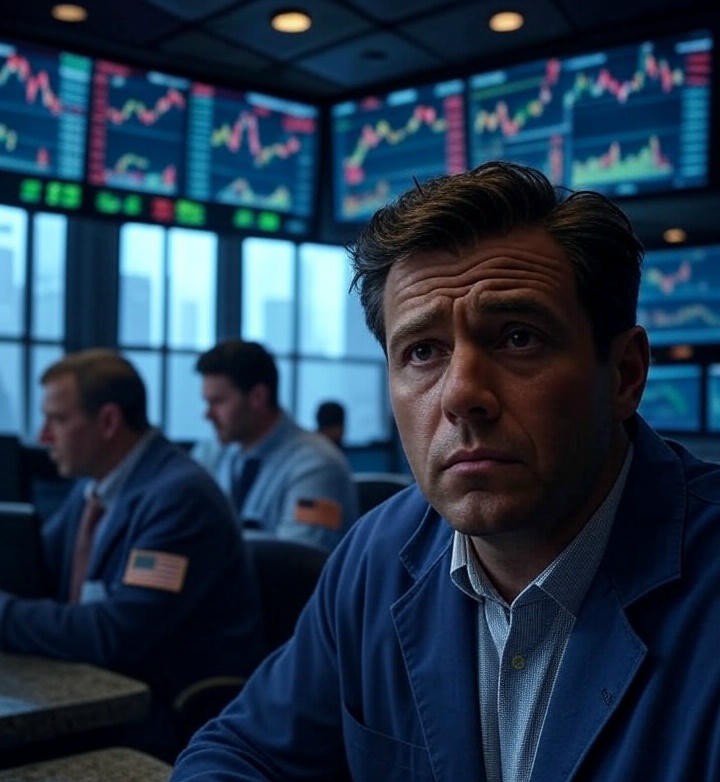The Global markets have taken a massive hit losing over $10 trillion in value. This historic downturn has left investors worried and economies shaken. The main reasons? Rising trade tensions and slowing economic growth.

What Caused the Global Market Crash?
The stock market rout is largely due to two big issues trade tensions and weaker economic growth. These problems are creating uncertainty which markets hate.
Escalating Trade Tensions
Trade tensions especially between the United States and China are a major driver of this market crash. The U.S. has imposed high tariffs (taxes on imported goods) on Chinese products and China has responded with its own tariffs. This back and forth often called a “trade war” disrupts global trade. For example U.S. tariffs on Chinese goods reached their highest level in a century causing a 21% drop in Chinese exports to the U.S. in April 2025.
These tariffs make goods more expensive, hurt businesses and reduce trade. Companies like Apple Google and Amazon saw their stocks fall as supply chains got disrupted. Small businesses and consumers are also feeling the pinch with higher prices looming. Posts on X show panic among investors with some calling it a “financial bloodbath” as major indices like the S&P 500 and Nasdaq dropped sharply.
Slowing Economic Growth
The second big issue is slowing economic growth. The International Monetary Fund (IMF) recently cut its global growth forecast to 2.8% for 2025 down from 3.3% earlier this year. The U.S. economy is expected to grow by only 1.8% in 2025 a sharp drop from 2.8% in 2024. This slowdown is partly because of trade disruptions which reduce demand for goods and services worldwide.
For example South Korea’s economy shrank by 0.1% in early 2025 and Europe’s growth is projected at just 0.8%. Businesses are holding back on investments and consumers are spending less due to uncertainty. The U.S. trade deficit hit a record $140.5 billion in March 2025 showing how trade issues are hurting economies.
How Are Markets Reacting?
The $10 trillion loss in global markets reflects investor fear. Major indices like the Dow Jones S&P 500 and Nasdaq have seen sharp declines. On May 22, 2025 the Dow fell 1.9% the S&P 500 dropped 1.6% and the Nasdaq lost 1.4%—their biggest daily losses in a month. European and Asian markets also struggled with double digit falls in Germany and Hong Kong.
Gold prices often a safe haven during uncertainty hit a record $3400 per ounce in 2025 up 20% this year. Meanwhile oil prices sank to their lowest since 2021 due to fears of weaker demand. These trends show investors are bracing for tough times.
Why Does This Matter to You?
You might be wondering “How does this affect me?” A stock market crash does not just hurt wealthy investors—it impacts everyone. Here’s how:
- Higher Prices: Tariffs make imported goods more expensive which could raise the cost of everyday items like electronics, clothes and food.
- Job Risks: Slowing economic growth means businesses might cut jobs or freeze hiring. The U.S. saw job openings drop by 3.9% recently a worrying sign.
- Retirement Savings: If you have a 401(k) or pension plan tied to the stock market its value might take a hit.
- Global Impact: This is not just a U.S. or China problem. Countries like India, Japan and those in Europe are also feeling the pressure which could affect global trade and local economies.
Is a Recession Coming?
Many experts are worried about a possible recession. The IMF says the odds of a U.S. recession have risen to 37% up from 25% earlier. Some like Apollo Global Management’s chief economist put the chance of a “trade reset recession” at 90%. However others argue it’s not a done deal. If trade tensions ease or governments step in with support (like tax cuts or lower interest rates) the damage could be limited.
The European Central Bank recently cut interest rates to 2.25% to boost growth and China is trying to stimulate its economy. These steps might help but uncertainty remains high.
What’s Next for Global Markets?
The future depends on how trade tensions and economic policies play out. Recent news offers some hope. In May 2025, the U.S. and China agreed to pause tariffs for 90 days to negotiate, sparking a brief market rally. However, experts warn it could take years to fully resolve these issues.
Governments and central banks are under pressure to act. The IMF is calling for coordinated action to reduce trade barriers and stabilize markets. Investors are also watching the U.S. Federal Reserve which faces pressure to cut interest rates to support growth.
How to Stay Informed and Prepared
This market downturn is a reminder of how connected the global economy is. Here are a few tips to stay ahead:
- Follow Trusted News: Check reliable sources like Reuters, Bloomberg or The New York Times for updates on markets and trade talks.
- Diversify Investments: If you invest spread your money across different assets to reduce risk.
- Save Smart: Build an emergency fund to prepare for economic uncertainty.
- Stay Calm: Markets go up and down. Panic selling can lead to bigger losses.
Final Thoughts
The $10 trillion global market crash is a wake up call. Trade tensions and slowing growth are creating a stormy economic environment. While there’s hope for recovery—especially if trade talks succeed—the road ahead is uncertain. By staying informed and prepared you can navigate these challenging times. What do you think about this market downturn? Comments now.
